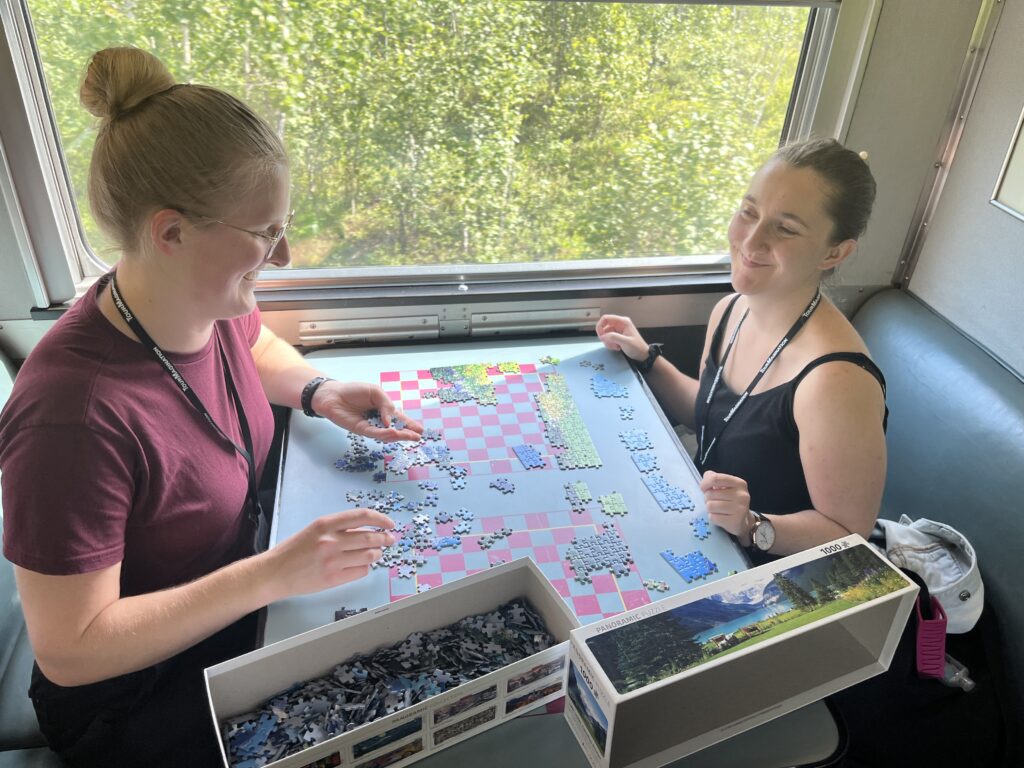by Michaela Hiebert
“This is awful.” I made this conclusion five minutes after arriving alone in Toronto amid the thousands of others at Lester B. Pearson International and I couldn’t help but wonder if the Russländers thought the same thing stepping off the train in 1924. Like the Russländers, I was arriving tired, hungry and with my trip paid for on someone else’s dime. Unlike the Russländers however, I had the benefit of English as a first language and a supercomputer in my pocket.
Despite being wholly Kanadier descent—the ones who stayed via my father’s side and the ones who left and came back by way of my mother’s—I’m intimately familiar with the history and individual stories of those who left the Soviet Union for Canada. I’ve taken plenty of Mennonite Studies courses over the course of my undergrad at UWinnipeg and I’ve made the Russian Mennonite Immigrant Oral History Project (RMIOHP) the focus of my Master’s in Archival Studies.
Yet much like the puzzles provided in the activity car of the VIA trains, I was missing some pieces that I didn’t know I was missing. Listening to oral histories about the Makhnovshchina period, I was always frustrated how discussions of sexual violence were discussed quickly and without much detail—suggesting attempts to conceal and distance due to immense shame. Does women’s trauma not deserve to be heard? Do they not deserve empathy? As Aileen Friesen’s talk at the CTMS conference shows however, not naming names can be considered an act of kindness on the part of the community. Everyone knew what happened, no sense in pointing fingers scornfully. Natalia Venger’s talk also gave me much context oral histories with Russländers could not. The stories I heard held up B. B. Janz and David Toews as supermen, fighting the Soviet juggernaut tooth and nail to lead the Mennonites to a new promised land. Instead, the Mennonites had unlikely allies including a high-ranking Cheka officer.

Of course, the piece I was missing in my study of the Russländers was the connection to the here and now. I came to know about the RMIOHP through my work for Aileen transcribing the English language interviews for accessibility. As I listened to each interview, I became immersed in the themes of each story: Ukraine was paradise and then it was hell; David Toews and B.B Janz did the impossible; Riga to Southampton to Canada; the kindness and callousness of coreligionists; the list of past events goes on. It wasn’t until the conversations on the train and at the conference that I found out I had not in fact heard it all from my line of work. The descendants of the Russländers still carry and speak about a hurt that cannot be captured easily on a recording. Nor can the gratitude they feel towards David Toews be felt through sound waves in your ears; it can only be palpably felt by his graveside. Also missing from the oral history recordings is the perspective of the Russians and Ukrainians who lived alongside the Russländers. The participants of the RMIOHP all had differing views of their Slavic neighbours and Dr. Venger’s talk was concerned with the Soviet state. How are we—myself included—supposed to write nuanced histories while only considering one side’s perspective and trauma? There appears to be little lingering resentment and much compassion for the Mennonites on the part of the Russian and Ukrainian scholars who engaged with the tour events and shared their knowledge. Indeed, Maria Lotsmanova’s poignant and visually compelling short documentary I Have Nothing to Add about her great-grandfather Jacob Janzen’s arrest and later execution serves to underscore the point that Russians too were scorched by the cruel and authoritarian “Soviet inferno.”
There were moments on the trip where I was once again hungry, tired, or both simultaneously. There were moments where I would have preferred to be left to my own devices instead of singing “Gott gruesse Dich” for the third time in as many days. Yet looking back on the Russländer tour, I can say that it was overwhelmingly an enlightening and spiritually fulfilling nine-day experience. I can say that it was not in fact, awful.
Michaela Hiebert recently entered the Joint Masters Program in History at the University of Winnipeg and the University of Manitoba.
